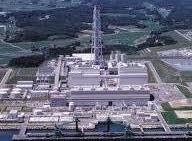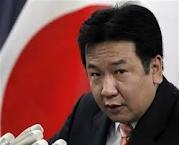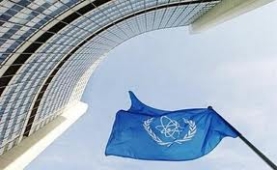Japan
Japan’s nuclear “stress tests” get UN nod
The United Nations says Japan’s nuclear reactors are safe but . . .
Japan’s nuclear “stress tests” get UN nod
The United Nations says Japan’s nuclear reactors are safe but . . .
U.N. nuclear agency approves Japan's stress tests
U.N. nuclear experts have endorsed stress tests designed to show that Japanese nuclear plants could withstand a repeat of last year's quake and tsunami, as the government campaigns to restart idled reactors and avoid a summer power crunch. The government, though, still faces an uphill battle to restore public trust in the nation's power utilities after the March 11 disaster wrecked the Fukushima nuclear power plant, triggering the world's worst nuclear crisis in 25 years. The Vienna-based International Atomic Agency's (IAEA) team has been in Japan at the request of the government to review stress tests conducted by its Nuclear and Industrial Safety Agency (NISA) on halted nuclear reactors to verify their safety. "We concluded that NISA's instructions to power plants and its review process for the comprehensive safety assessments are generally consistent with IAEA safety standards," James Lyons, the leader of the 10-member IAEA team, said Tuesday. "We were very impressed with the way Japan quickly implemented the emergency safety measures after the accident in March. They have also been very active in participating in the international community to determine the steps forward," Lyons added to reporters. He also pointed out areas that Japan could improve upon, such as communicating with local communities about stress tests. "NISA had done a good job in the transparency of information on their website, but we feel that it is also important for them to hold meetings in the vicinities of nuclear power plants to discuss their findings with the local population," Lyons said. Stress tests are computer simulations that evaluate a nuclear reactor's resilience to severe shocks. NISA completed a review of the stress tests earlier in January and said they showed reactors at Fukui prefecture's Ohi plant, the first to be assessed, were capable of withstanding an impact similar to the magnitude 9.0 earthquake and massive tsunami that wrecked the Fukushima plant. Some experts, however, have questioned the validity of the stress tests, charging the IAEA's visit was just for show. "It is obvious that a visit by an international organization advocating nuclear power is part of a political agenda that is built into a story already finished in advance," said University of Tokyo professor Hiromitsu Ino and former nuclear plant design engineer Masashi Goto in a joint statement last week. Ino and Goto, who serve on a committee that advises on NISA's review of the stress tests, said the tests were insufficient as they only simulate one natural disaster at a time and do not take into account the possibility of the sort of equipment failure and human error seen at Fukushima. Others suggested the IAEA's stamp of approval would not be enough to alleviate public concern. "The public mistrust toward the government's handling of information over the nuclear accident is high and I don't think the review will change that," said Atsuo Ito, a political analyst. ENERGY POLICY SHIFT In another effort to restore public confidence in nuclear power, the cabinet Tuesday approved bills that would set up a new nuclear safety agency, separating regulation of the industry from the trade and industry ministry, which has promoted nuclear power and came under criticism for its cozy ties with utilities. The Fukushima disaster has also prompted a major shift in Japan's energy policy. The resource-poor nation had aimed to increase the share of nuclear power from a third to more than half of the power supply by 2030 before the disaster, but it now looks to reduce its reliance on nuclear power and raise the role of renewable sources such as wind and solar power. But with only three of the country's 54 nuclear reactors running, and public anxiety preventing the rest from being restarted after routine checks, the government wants to avoid a an economically crippling power crunch in the summer and hopes the stress tests will help persuade a wary public that it is safe to restart some of the reactors. Local governments hosting nuclear plants, however, have said the stress tests were not sufficient to allow them to give their approval, with some requesting that findings from the Fukushima disaster be considered in drafting new safety standards as well. "A utility would not be violating any law if it went ahead and restarted a reactor after properly completing scheduled maintenance. But the Fukushima accident has heightened public concern over nuclear safety, making local consent an important part of the restart process," a trade ministry official said. Japan had promoted nuclear power as safe, cheap and clean before the Fukushima crisis. "The myth that nuclear power was absolutely safe is a theme we will explore. We need to find out how such a mindset developed," Kiyoshi Kurokawa, head of a parliamentary committee investigating causes of the Fukushima accident, told reporters Monday here
India, Japan collaborate to study improvements of coal-fired plants
India's CEA and the Japan Coal Energy Center are studying the possibilities of efficiency and environment improvements at India's coal fired plants.
Kansai Electric incurs $1.5B net loss in April-Dec.
Kansai Electric suffered a net loss of US$1.548 billion in the April-December period.
LTA application for NTPC's 1,320 MW Tanda power project awaited
The LTA application from NTPC for it's 1,320 MW Tanda power project in Uttar Pradesh is yet to be received, according to Powergrid.
Tohoku Electric expects $3.279B net loss for fiscal 2011 due to quake
Tohoku Electric expects a net loss of US$3.279 billion for the fiscal year ending March 31 due to the March earthquake.
Japan's nuke plant-dependent town hushes nuke criticism
Ohi mayor Shinobu Tokioka wants the Japanese government to come up with a comprehensive set of safety standards and measures based on information from the Fukushima accident.
Tohoku secures more LNG to offset power plant losses
Tohoku Electric secured 2.2 million tonnes of additional LNG to offset lost output from two quake-damaged nuclear and fossil fuel plants.
Japan confident of avoiding summer power cuts sans nuke plants
The government of Japan announced that the country will avoid power cuts this summer even without nuclear power.
Japanese sell more solar power back to utilities
Japanese small solar panel owners sold 50 percent more power to utilities last year than in 2010. Owners sold a total 2,150 gigawatt hours to power utilities last year, helped by the government scheme. The data showed Japan's 10 regional power companies spent a total 96 billion yen or $1.2 billion for surplus solar power from house owners and small businesses last year via a feed-in tariff scheme, which requires them to buy such power, reports Reuters. Last year's purchase volume is equivalent to 0.24 percent of sales from the power companies of some 884,000 gigawatt hours a year on average in the three years to March 2011. In 2010, power companies bought 1,400 gigawatt hours of such surplus solar power via the same scheme. When a full-fledged scheme applying any electricity from solar, wind, small hydro, biomass and geothermal power plants is launched in July, the existing one will remain but cover surplus power from solar panel owners of up to 10 kilowatts only. Currently, regional power firms pay 48 yen per kilowatt hour for surplus electricity from solar panel owners of less than 10 kilowatts and 24 yen for surplus power from owners of 10 to 500 kilowatts, and allowed to add on the extra costs to all users in the same region evenly.
Tepco amenable to $13B govt bailout: sources
Tepco will agree to be taken over by the government in a near-$13 billion bailout.
UN team reviews Japan's nuclear stress tests
Tests conducted by Japan to prove the safety of its nuclear reactors is now being reviewed by UN nuclear experts.
Tepco may sell older fossil-fuel plants
Tepco may sell or invite outside investments for its older fossil fuel-fired power plants.
Japan's wind capacity records slowest growth in 10 years
Japan's wind power capacity rose 11.7 percent in the year to March 2011as the country was set to launch a new subsidy system to lure investors to the sector.
Restart of Japanese nuke plants sparks protests
Japan's push to restart nuclear reactors by proving their safety through stress tests sparked an angry response from the public.
Japan’s nuclear power plants are on the verge of extinction
Nuclear power in Japan faces its moment of truth.
Asian heavy hitters look to fund multi-million dollar energy projects
So who are the new angel investors of big-ticket Renewable Energy projects?









 Advertise
Advertise


















